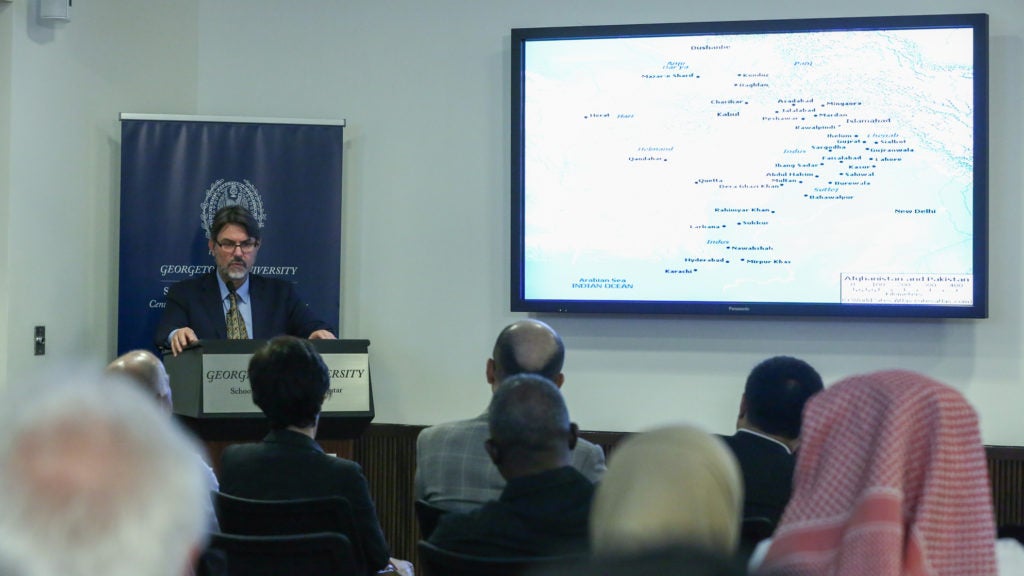Georgetown Scholar Explains The Past, Present, and Future of Afghanistan’s Endless War

Georgetown University in Qatar (GU-Q) professor, Dr. Anatol Lieven, spoke to a packed on-campus audience in a lecture titled “Afghanistan: War Without End?” where he shared his observations as a journalist embedded with the mujahideen following the withdrawal of Soviet troops in the late 1980s and as a researcher in Afghanistan since the overthrow of the Taliban, and explained the current challenges Afghanistan is presenting the forces and foreign policy choices of the United States.
Lieven set out his arguments for why the future of Afghanistan may be one where neither the Afghan regime, politically divided and on artificial US life support, nor the Taliban opposition, would ever regain dominance over the whole country. “It is now inconceivable that national Kabul forces, without peace and cooperation with the Taliban, can reconquer the southeast. And the Taliban knows they won’t get back the maximum level of control they enjoyed in 2001.” He described this impasse as possibly leading to a “peace of exhaustion”, where no single force is capable of winning nor interested in breaking up the country.
After offering comparisons between the effects of Soviet military withdrawal in 1989 and the withdrawal of most US troops today following President Obama’s dangerous initial promise to end engagement by the end of his term, Dr. Lieven concluded that the most likely future scenario is one of, “long messy warfare between various actors with much of the Taliban controlling some of the country, and with support of the US and other regional actors like India and Russia allowing their allies to hold other pieces of land.” He predicted that this scenario will continue until “U.S. and Western support ends, and disintegration of the country begins.”
He cited the main factor for why the U.S. would not be able to withdraw entirely from Afghanistan, despite President Obama’s promise to do so, as the country’s total dependence on foreign aid. “One thing remains the same now as after USSR withdrawal in 1989,” he said, is that: “Afghanistan is now more dependent than any other time in its history. 90% of the state budget depends on outside aid. 100% of security is provided by the US. The hope is that in some future stage Afghanistan will be able to develop its own resources but that hasn’t even begun.” The risk of removing that support and causing state collapse is compounded by the collapse of Iraq and Syria, and the rise of the Islamic State.
His presentation was part of the Monthly Dialogue Series hosted by the university’s Center for International and Regional Studies (CIRS), one of many public events open to the Doha community, and frequently attended by faculty, students, and staff, as well as diplomatic and government representatives. “Dr. Lieven’s personal travels to the region, his relationships and interactions with the key players in Afghanistan’s complex political, military, and social landscape, provided our audience with insights that went well beyond textbook analysis and scholarship. This is what makes our public lecture series such a fascinating, and successful, opportunity for the Qatar community,” said the Director of CIRS, Dr. Mehran Kamrava.
Anatol Lieven is a GU-Q professor based in Doha, Qatar who worked as a British journalist in South Asia and the former Soviet Union from 1986 to 1998. He is a visiting professor in the War Studies Department of King’s College London and a senior fellow of the New America Foundation in Washington DC. His latest book, Pakistan: A Hard Country was published in 2011.